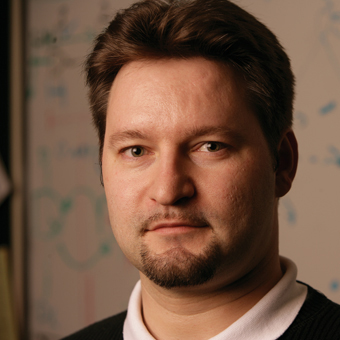


|
 |
Student News |
| CSE Students Finish Ninth in ACM Contest <more> |
Dai Receives Honorable Mention at Bioengineering Conference <more> |
| Electrical Engineering Students Establish
Amateur Radio Club <more> |
| Engineering Industry Day Features 70 Companies <more> |
| Introduction to Engineering Program Hosts High School Students <more> |
| SWE Awards Scholarships to Notre Dame
Engineers <more> |
Alumni News |
| Carlos A. Paz deAraujo (B.S., EE ’99;
M.S., EE ’79; and Ph.D., EE ’82); Larry Augustin (B.S.,
EE ’84); Gerald M. Belian (B.S., CE ’62); James G. Berges
(B.S., EE ); John F. Daegele (B.S., EE ’83); Allen Hemberger
(B.S., CSE ’01); Casey Korecki (B.S., ME ’03); David Kowalski
(B.S., ME ’80); Mary Ledet (B.S., EE ’04); Jerome L. Margraf
(B.S., ME ’67); Richard O. Martin (M.S., EE ’ 64); Don
McBride (B.S., EE ’66); Edward J. Nowacki (M.S., EE ’67);
Haresh P. Patel (B.S., EE ’83); Gang Quan (Ph.D., CSE ’02);
Niel Ransom (Ph.D., EE ’73); James Schmiedeler (B.S., ME ’96);
Robert Stackowiak (B.S., CE ’78); William Stanchina (B.S., EE ’71);
Jim Tyler (B.S., ME ’86); and Jinhui Xu (Ph.D., CSE ’00). |
| To visit College of Engineering Alumni News <click here> |
Laneman and Poellabauer Receive NSF CAREER Awards
Two faculty from the College of Engineering have been
selected to receive a 2006 CAREER award from the National Science Foundation
(NSF). The most prestigious award in support of junior faculty, the NSF
CAREER award honors teacher-scholars who creatively and effectively integrate
research and education within the context of the mission of their own
institution.
J. Nicholas Laneman, assistant professor of electrical
engineering, was selected as a CAREER recipient based upon his project
proposal “Toward a Renaissance in Finite Blocklength Information
Theory.” In communication systems, blocklength refers
to the amount of time allowed for encoding a given amount of information.
On one hand, longer blocklengths lead to more reliable transmission, but
longer blocklengths also contribute to longer delays. Although delays may
be acceptable for some applications, such as e-mail or text messaging,
they can be unacceptable for other applications, such as cell phone calls
or video streaming. Laneman
and his students in the Department of Electrical Engineering are attempting
to determine via theoretical analysis, computer simulations, and test
bed experiments the optimum blocklengths for specific applications in
communication systems or networks that would balance the tension between
reliable communication and tolerable delays.
 Assistant
Professor Christian Poellabauer received the award for
his project titled “Judicious Resource Management in Wireless Systems.” Poellabauer
and students in the Department of Computer Science and Engineering have
been studying the resource constraints of mobile devices and the limits
currently faced by such devices, particularly those that work within a
network. While there has been an abundance of research addressing
resource interdependencies, most mobile devices are “selfish” in
their use of energy and the effect that the management of individual resources
can have on total resources and applications. The judicious approach being
studied by Poellabauer shuns traditional management solutions while focusing
on the prevention of unanticipated side effects of resource adaptations
and new classes of protocols and management techniques and approaches.
Students working with Poellabauer are testing a variety of theories on
an experimental test bed and via cross-campus simulations with handheld
devices.
Assistant
Professor Christian Poellabauer received the award for
his project titled “Judicious Resource Management in Wireless Systems.” Poellabauer
and students in the Department of Computer Science and Engineering have
been studying the resource constraints of mobile devices and the limits
currently faced by such devices, particularly those that work within a
network. While there has been an abundance of research addressing
resource interdependencies, most mobile devices are “selfish” in
their use of energy and the effect that the management of individual resources
can have on total resources and applications. The judicious approach being
studied by Poellabauer shuns traditional management solutions while focusing
on the prevention of unanticipated side effects of resource adaptations
and new classes of protocols and management techniques and approaches.
Students working with Poellabauer are testing a variety of theories on
an experimental test bed and via cross-campus simulations with handheld
devices.
Copyright 2006. University of Notre Dame.